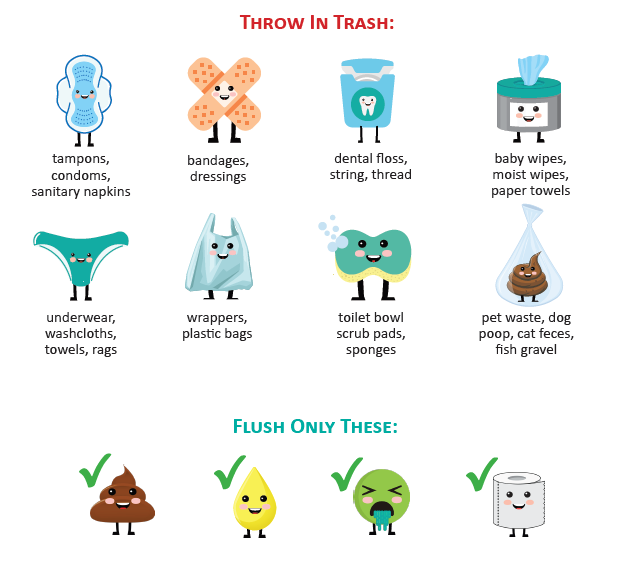Toilets are not trash cans
Just because something can physically go down the toilet doesn’t mean it should. In fact, the only things that should be flushed down the toilet are human waste and toilet paper. Toilets are not trash cans, and everything else is a nonflushable.
What is the harm with Nonflushables?
Every day, District staff find items at the treatment plant and in the sewer collection system that shouldn’t be there.
Improper disposal of nonflushable or unflushable items – such as wipes, dental floss, diapers and tampon applicators – or fats, oils and grease (called FOGs for short) poured down kitchen drains, can result in expensive and messy sewer backups in your home or business. Nonflushables can also cause problems in the collection system by blocking sewer pipes, damaging pumps and requiring extra cleaning, which results in higher costs to users of the system.
The best and most cost-effective way to avoid clogged pipes and sewer backups is to keep nonflushables and FOGs out of your pipes and the sewer system in the first place.
Bathroom items and “Flushable” wipes
Only flush pee, poop, puke and toilet paper. Dental floss, plastic wrappers, bandages, tampon applicators, kitty litter and cat poo, toys and other items can get stuck and clog the sewer line that connects your home or business to the District’s sewer system and cause messy, expensive backups or degrade your sewer line.
Wipes
Unfortunately, “flushable” wipes are not actually flushable. Despite their names, most types of wipes – including baby wipes, personal hygiene wipes, makeup removing wipes, disinfecting wipes, etc. – are not designed to disintegrate or break down in water like toilet paper. When wipes are flushed down the toilet, the can get caught in pipes, causing clogs or back-ups in the sewer system. The “flushable” label does not mean that a wipe can be flushed! Place these items in the trash.
Tissues or paper towels
The fibers in facial tissues, Kleenex and paper towels are intentionally woven to withstand abuse in water. Even though these items might seem like a suitable substitute for toilet paper, these thicker paper products belong in the garbage. Some products have plastics or chemical additives like lotions or scents that are better for tossing than flushing.
Menstrual products
Never, ever flush tampons, pads, applicators, plastic wrappers or other menstrual collection products or materials used for menstruation. Period products get caught in pipes in homes, businesses and our treatment systems which can lead to messy backups or broken systems. Keep a trash receptacle next to commodes in bathrooms and be sure to educate toilet users that these items belong in the garbage.
Condoms
Flushing condoms is a big NO-NO. Similar to tampons, condoms can cause massive damage to plumbing and sewer pipes. And they latex they’re made from is non-biodegradable. Be sure to toss contraceptives, rubbers and other items that protect against pregnancy in the trash can. To be more discreet or secretive, wrap the used condom in toilet paper or bath tissue before tossing.
Household Items
- FOGS – Fats, Oils and Grease
- Wipe dishes clean into the trash before washing or putting in the dishwasher.
- Use a mesh filter on kitchen sink drains to keep items from accidentally going down the drain.
- Let fats, oils and grease harden or cool and put them in the garbage instead of down the drain; the City of Madison also accepts cooking oil for recycling.
- Get more tips in our article “FOGs clog: No fats, oils and greases in drains.“
- Pet Waste
- Pet waste should not be flushed down the drain. Pet waste, kitty litter or bagged pet poop should always be placed in the outdoor trash or waste management receptacle.
- Unlike human waste, pet waste contains elements like grass, dirt, raw hide, hair and materials that can create blockages in pipes. Even if litter or doggie bags are labeled as flushable, they are not safe for plumbing or the sewer system.
- House and Home
- Floor drains, garage drains and utility sinks impact your sewer line and are not a place to dump things such as household chemicals and paint. In Dane County, the Clean Sweep program provides safe, appropriate disposal for these items.
- Be mindful of phosphorus runoff and pollution in wastewater. Find a few easy ways to reduce phosphorus at home in our article “Simple ways to reduce phosphorus pollution.”
- Reduce the impacts of your chloride use at home by making your water softener more efficient. See our water softener efficiency page or read our article “Soften water with less salt using blending valves” for helpful strategies.
- Homeowners are responsible for their sewer lateral, which is the sewer line that runs from the home to the street. When a sewer lateral gets clogged or tree roots grow into it, it is expensive and messy to fix. Minimize sewer lateral issues by only sending the appropriate items down the drain and toilet, and if you know you have tree root issues, put yourself on a preventative maintenance schedule. Businesses should also clean their laterals on a regular basis.
Business and restaurants
Restaurants, commercial kitchens and other businesses engaged in food preparation or food service should maintain grease traps through regular servicing and record keeping to prevent backups and fires. Also, keep beverage waste such as straws, stir sticks and tea bags out of the garbage disposal and your sewer line.
Businesses, schools and other public facilities are encouraged to provide appropriate waste receptacles with liners in bathroom facilities. Putting up signage or educational flyers can encourage employees, patrons and users to properly dispose of items.
We can all spread the word by talking to family members, friends and coworkers about how to protect our pipes. Be sure to visit the Pollution Prevention section of our blog for interesting articles and helpful tips on keeping water clean.








